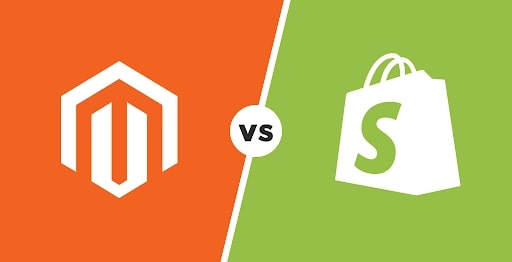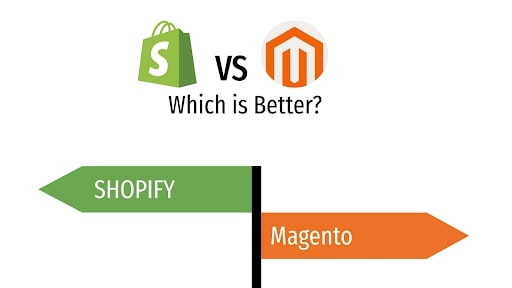When venturing into the world of online business, entrepreneurs and business owners must carefully weigh multiple factors to select the perfect e-commerce platform for their needs. The decision-making process involves deeply understanding the store's size, product inventory, available payment and shipping options, and the desired user experience. Opting for the right platform requires finding a balance between the merchant's unique requirements and their customers' preferences. This comprehensive article compares two leading e-commerce platforms, Shopify and Magento, boasting large online communities. Despite offering unique experiences, these platforms differ significantly in their target audiences. Magento caters to larger enterprise-level businesses, while Shopify targets small and medium-sized businesses (SMBs), prioritizing ease of use over advanced functionality. Shopify and Magento are the leading ecommerce platforms used by countless businesses worldwide, each providing many features to quickly establish online stores.
Shopify vs Magento. A Quick Overview
Shopify serves as a hosted platform, eliminating the need for users to worry about website hosting. It offers an intuitive drag-and-drop interface, a wide array of themes and templates, and integrated payment processors, making it a hit among small business owners seeking a simple and affordable solution. On the other hand, Magento operates as an open-source platform, requiring users to manage their hosting. Though it demands more technical knowledge, it rewards with unmatched flexibility and customization options, attracting larger businesses and those needing advanced features. Before comparing Shopify and Magento, let's take a moment to understand each platform's offerings, enabling a well-informed decision when choosing the ideal ecommerce platform.
What is Shopify?
Shopify is a comprehensive commerce platform that empowers businesses to grow and manage their operations effectively. It boasts its leadership in commerce based on the experiences of millions of merchants on its platform. With Shopify, merchants can create and customize online stores, reaching customers across various channels, from web and mobile to brick-and-mortar locations and social media. Operating on the cloud, Shopify's hosted solution allows users to access and run their businesses from anywhere with an internet connection. It provides robust tools, including customizable templates, online and in-person selling capabilities, integrated payment processing, SEO features, marketing tools, and access to Shopify APIs for further customization. Additionally, Shopify offers powerful upgrades, more accessible access to capital, and a rich ecosystem of third-party apps available on the App Store, allowing merchants to customize their stores without touching a single line of code. The platform also boasts a marketplace of Shopify Experts who can create tailor-made solutions for businesses.What is Magento?
Magento, now under Adobe Commerce, presents an open-source ecommerce platform catering to some of the world's top brands. Launched in 2008 by Varien, Magento has emerged as one of the most popular choices for ecommerce. Developed in PHP, it incorporates frameworks like Laminas and Symfony and uses the MySQL or MariaDB relational database management system. Magento's features encompass a flexible shopping cart system, support for multiple payment gateways, shipping methods, and languages, as well as a comprehensive set of marketing, SEO, and catalog-management tools. Its enterprise-grade database scalability, server-side Apache Varnish caching, and improved static content browser caching contribute to exceptional performance and security. The platform excels for larger businesses seeking to sell products online. Its flexible model for store changes and robust customizability allows merchants to create unique, non-plagiarized content to differentiate their stores from competitors.What’s the Difference Between Shopify & Magento?
Now, let's delve into the distinctions between Shopify and Magento and examine how they compare. The first significant difference lies in the hosting approach. Shopify's hosted nature makes it effortless for users, as they don't need to manage their website hosting. In contrast, Magento's open-source model requires users to handle their hosting, adding complexity and additional steps during the setup process. The second significant difference emerges in the features and functionalities offered by each platform. Shopify leans towards simplicity and ease of use, but it has some limitations regarding features and customization options. On the other hand, Magento boasts a more intricate structure, providing advanced features and extensive customization possibilities. Lastly, the pricing plans present another distinction. Shopify offers more affordable plans, catering to various business needs, while Magento tends to be more expensive. In summary, both platforms have their strengths and weaknesses, and the choice to migrate from one solution to another (e.g., Magento to Shopify) depends on individual business requirements, technical expertise, and budget considerations. Shopify provides simplicity and cost-effectiveness, while Magento empowers enterprises with advanced features and extensive customization options. A well-informed decision will lead to successfully establishing a thriving online presence for any business.Shopify vs Magento: The Main Features & Functionalities
In the dynamic world of ecommerce, Shopify continues to shine as it captures a significant portion of the market share, and rightfully so. With its robust platform, Shopify offers numerous advantages, making it an excellent choice for businesses across various industries. Let's take a closer look at some of the key benefits of using Shopify for hosting an online store:- User-Friendly Interface: Shopify boasts an intuitive drag-and-drop interface, allowing users to easily create and manage their stores without the need for coding skills.
- Extensive Theme Library: The platform offers diverse themes and templates, providing ample customization options to suit any brand or style.
- Seamless Payment Processing: With a wide array of built-in payment processors, Shopify ensures smooth and secure customer transactions.
- Reliable Customer Support: Shopify's 24/7 customer support ensures that assistance is readily available whenever merchants need it.
- Versatile App Store: The platform's comprehensive app store offers a wealth of add-ons and extensions to enhance store functionalities.
- Scalable Pricing Plans: From small startups to thriving enterprises, Shopify's affordable and scalable pricing plans cater to businesses of all sizes.
- Limited Inventory and Fulfillment Options: Some businesses may find the inventory and fulfillment options somewhat restricted compared to other platforms.
- Customization Limitations: While Shopify allows for easy store setup, it may have limitations regarding extensive customization.
- International Selling Constraints: Shopify's international selling capabilities may not be as robust as other platforms.
- Enterprise Plan for Large Businesses: The enterprise plan might be necessary for large-scale enterprises, which could be relatively more expensive.
- High Customizability: Magento offers unparalleled customization options, giving businesses complete control over the appearance and functionality of their stores.
- Comprehensive Inventory and Fulfillment: The platform provides a wealth of inventory and fulfillment options, catering to diverse business needs.
- Strong International Selling Capabilities: Magento's global selling features make it ideal for businesses with an international customer base.
- Robust Content Management: Magento's content management system empowers merchants to manage their websites effectively.
- Self-Hosting Requirement: Users must take responsibility for hosting their website, adding to the complexity of the setup process.
- Technical Complexity: Magento requires a deeper understanding of web development compared to the user-friendly nature of Shopify.
- Limited Support Resources: While support resources exist, Magento might not offer 24/7 customer support.



